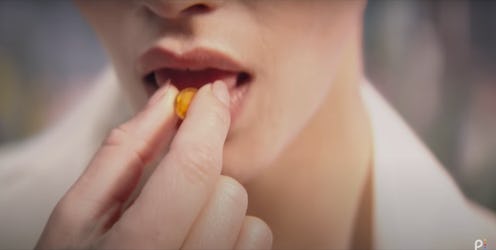TV & Movies
In Brave New World, Happiness Comes In The Form Of Soma
You'll be seeing a lot of soma pills in the new Peacock miniseries.

Aldous Huxley's dystopian classic Brave New World is getting the small-screen treatment with a new Peacock miniseries, starring Jessica Brown Findlay (Downton Abbey) and Alden Ehrenreich (Solo, Hail, Caesar!). Most of the novel takes place in the World State city of London, a futuristic society where citizens' lives are engineered before birth and carefully regulated until death. Disease doesn't exist, but neither do families or couples. But unlike many others literary dystopias —where order is maintained through threat and fear of pain — Brave New World is all about pleasure and happiness. And their main way of achieving happiness? By taking soma pills.
Soma is a regulated substance given out to all citizens in a pill form. In a small dosage soma simply makes people feel good. And in larger dosages it can make people hallucinate and experience a feeling of timelessness. The use of soma is extremely common throughout Brave New World — with people even taking soma "holidays" to distract themselves.
The leader of Brave New World's dystopia is Mustapha Mond. Early on in the book he meets with John, a newcomer to their way of life, during which he explains the importance of soma in their society. As he tells it, citizens are "so conditioned that they practically can't help behaving as they ought to behave. And if anything should go wrong, there's soma," Huxley writes in the book. However, as a religious outsider, John believes that the drug deprives citizens of free will. But Mond counters, claiming that soma offers, "all the advantages of Christianity and alcohol; none of their defects."
Huxley himself wasn't adverse to drug experimentation. In 1953, Huxley tried mescaline, a natural hallucinogen, and published the results in his nonfiction books The Doors of Perception (1954) and Heaven and Hell (1956). He continued psychedelic use up until his death in 1963, according to The Guardian.